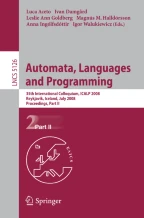Abstract
We present a new garbled circuit construction for two-party secure function evaluation (SFE). In our one-round protocol, XOR gates are evaluated “for free”, which results in the corresponding improvement over the best garbled circuit implementations (e.g. Fairplay [19]).
We build permutation networks [26] and Universal Circuits (UC) [25] almost exclusively of XOR gates; this results in a factor of up to 4 improvement (in both computation and communication) of their SFE. We also improve integer addition and equality testing by factor of up to 2.
We rely on the Random Oracle (RO) assumption. Our constructions are proven secure in the semi-honest model.
Access this chapter
Tax calculation will be finalised at checkout
Purchases are for personal use only
Preview
Unable to display preview. Download preview PDF.
Similar content being viewed by others
References
Aiello, W., Ishai, Y., Reingold, O.: Priced oblivious transfer: How to sell digital goods. In: Pfitzmann, B. (ed.) EUROCRYPT 2001. LNCS, vol. 2045, pp. 119–135. Springer, Heidelberg (2001)
Bellare, M., Micali, S.: Non-interactive oblivious transfer and applications. In: Brassard, G. (ed.) CRYPTO 1989. LNCS, vol. 435, pp. 547–557. Springer, Heidelberg (1990)
Bellare, M., Rogaway, P.: Random oracles are practical: A paradigm for designing efficient protocols. In: ACM CCS, pp. 62–73 (1993)
Blake, I.F., Kolesnikov, V.: Conditional encrypted mapping and comparing encrypted numbers. In: Di Crescenzo, G., Rubin, A. (eds.) FC 2006. LNCS, vol. 4107, pp. 206–220. Springer, Heidelberg (2006)
Canetti, R., Goldreich, O., Halevi, S.: The random oracle methodology, revisited. In: Proc. 30th ACM Symp. on Theory of Computing, pp. 209–218 (1998)
Crescenzo, G.D.: Private selective payment protocols. In: Frankel, Y. (ed.) FC 2000. LNCS, vol. 1962. Springer, Heidelberg (2001)
Even, S., Goldreich, O., Lempel, A.: A randomized protocol for signing contracts. Commun. ACM 28(6), 637–647 (1985)
Fischlin, M.: A cost-effective pay-per-multiplication comparison method for millionaires. In: Naccache, D. (ed.) CT-RSA 2001. LNCS, vol. 2020, pp. 457–471. Springer, Heidelberg (2001)
Goldreich, O., Vainish, R.: How to solve any protocol problem - an efficiency improvement. In: Pomerance, C. (ed.) CRYPTO 1987. LNCS, vol. 293, pp. 73–86. Springer, Heidelberg (1988)
Ishai, Y., Kilian, J., Nissim, K., Petrank, E.: Extending oblivious transfers efficiently. In: Boneh, D. (ed.) CRYPTO 2003. LNCS, vol. 2729. Springer, Heidelberg (2003)
Ishai, Y., Kushilevitz, E.: Perfect constant-round secure computation via perfect randomizing polynomials. In: Widmayer, P., Triguero, F., Morales, R., Hennessy, M., Eidenbenz, S., Conejo, R. (eds.) ICALP 2002. LNCS, vol. 2380, pp. 244–256. Springer, Heidelberg (2002)
Kantarcioglu, M., Clifton, C.: Privacy-preserving distributed mining of association rules on horizontally partitioned data. In: ACM SIGMOD Workshop on Research Issues on Data Mining and Knowledge Discovery (DMKD 2002) (2002)
Kilian, J.: Founding cryptography on oblivious transfer. In: Proc. 20th ACM Symp. on Theory of Computing, Chicago, pp. 20–31. ACM, New York (1988)
Kolesnikov, V.: Gate evaluation secret sharing and secure one-round two-party computation. In: Roy, B. (ed.) ASIACRYPT 2005. LNCS, vol. 3788, pp. 136–155. Springer, Heidelberg (2005)
Kolesnikov, V., Schneider, T.: A practical universal circuit construction and secure evaluation of private functions. In: Financial Cryptography and Data Security, FC 2008. LNCS. Springer, Heidelberg (2008)
Lindell, Y., Pinkas, B.: Privacy preserving data mining. In: Bellare, M. (ed.) CRYPTO 2000. LNCS, vol. 1880. Springer, Heidelberg (2000)
Lindell, Y., Pinkas, B.: A proof of Yao’s protocol for secure two-party computation. Cryptology ePrint Archive, Report 2004/175 (2004)
Lindell, Y., Pinkas, B.: An efficient protocol for secure two-party computation in the presence of malicious adversaries. In: Naor, M. (ed.) EUROCRYPT 2007. LNCS, vol. 4515, pp. 52–78. Springer, Heidelberg (2007)
Malkhi, D., Nisan, N., Pinkas, B., Sella, Y.: Fairplay — a secure two-party computation system. In: USENIX (2004)
Naor, M., Pinkas, B.: Efficient oblivious transfer protocols. In: SODA 2001: Proceedings of the twelfth annual ACM-SIAM symposium on Discrete algorithms, Philadelphia, PA, USA. Society for Industrial and Applied Mathematics (2001)
Naor, M., Pinkas, B., Sumner, R.: Privacy preserving auctions and mechanism design. In: 1st ACM Conf. on Electronic Commerce (1999)
Nielsen, J.B.: Separating random oracle proofs from complexity theoretic proofs: The non-committing encryption case. In: Yung, M. (ed.) CRYPTO 2002. LNCS, vol. 2442, pp. 111–126. Springer, Heidelberg (2002)
Pinkas, B.: Cryptographic techniques for privacy-preserving data mining. SIGKDD Explor. Newsl. 4(2), 12–19 (2002)
Sander, T., Young, A., Yung, M.: Non-interactive cryptocomputing for NC 1. In: Proc. 40th FOCS, New York, pp. 554–566. IEEE, Los Alamitos (1999)
Valiant, L.G.: Universal circuits (preliminary report). In: Proc. 8th ACM Symp. on Theory of Computing, pp. 196–203. ACM Press, New York (1976)
Waksman, A.: A permutation network. J. ACM 15(1), 159–163 (1968)
Yao, A.C.: Protocols for secure computations. In: Proc. 23rd IEEE Symp. on Foundations of Comp. Science, Chicago, pp. 160–164. IEEE, Los Alamitos (1982)
Yao, A.C.: How to generate and exchange secrets. In: Proc. 27th IEEE Symp. on Foundations of Comp. Science, Toronto, pp. 162–167. IEEE, Los Alamitos (1986)
Author information
Authors and Affiliations
Editor information
Rights and permissions
Copyright information
© 2008 Springer-Verlag Berlin Heidelberg
About this paper
Cite this paper
Kolesnikov, V., Schneider, T. (2008). Improved Garbled Circuit: Free XOR Gates and Applications. In: Aceto, L., Damgård, I., Goldberg, L.A., Halldórsson, M.M., Ingólfsdóttir, A., Walukiewicz, I. (eds) Automata, Languages and Programming. ICALP 2008. Lecture Notes in Computer Science, vol 5126. Springer, Berlin, Heidelberg. https://doi.org/10.1007/978-3-540-70583-3_40
Download citation
DOI: https://doi.org/10.1007/978-3-540-70583-3_40
Publisher Name: Springer, Berlin, Heidelberg
Print ISBN: 978-3-540-70582-6
Online ISBN: 978-3-540-70583-3
eBook Packages: Computer ScienceComputer Science (R0)
